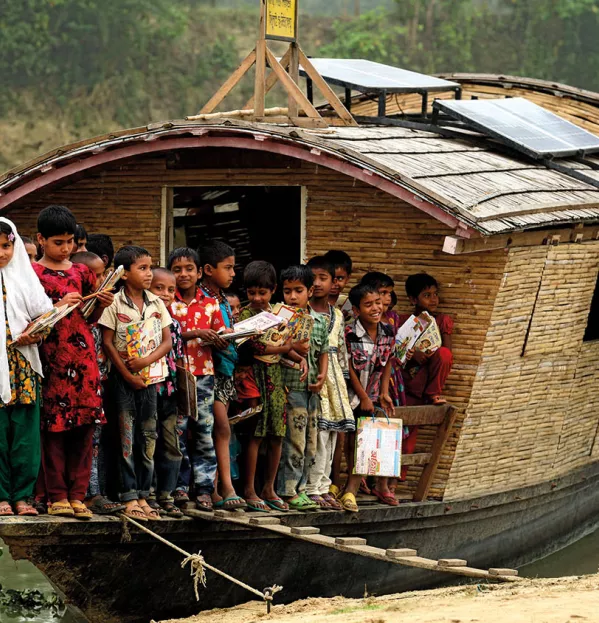You’re standing at the front of the classroom projecting images onto the wall and the children are following along in their textbook as you speak. But that wall is not brick and plaster, it’s actually a canvas sheet. There are no desks or chairs either, just wooden benches. The floor, meanwhile, is made from bamboo. And that sound? That’s water lapping gently against the hull of a boat.
Getting children to school in the UK has been tough in the past few months with all of the Covid restrictions, but for 122,000 students in Bangladesh, school attendance in the monsoon season has always been difficult. That was until Shidhulai Swanirvar Sangstha, a non-profit organisation, started building school boats.
The problem was monsoon-season flooding. Founder and executive director Mohammed Rezwan explains that children were spending up to six months of the year unable to access education because of persistent flooding in their region. Those children weren’t wealthy enough to have access to a boat to get to an unaffected school so they simply put their learning on pause.
Rezwan was from an affected village and wanted to help. After studying architecture, he put $500 of his money into the building of a ‘school boat’. The Shidhulai organisation was born.
“[Bangladeshi communities] have been using boats as transportation for thousands of years, and our people have the skill and knowledge and the natural resources to build these kind of boats,” he says.
The vessels are created in collaboration with local boat builders using traditional tools knowledge and tools: bamboo is used for sustainability and waterproofing; the boats are flat-bottomed to travel through shallow water and reinforced against heavy rainfall. Powered by solar panels on the roofs, the classrooms support a range of IT equipment, including wi-fi routers, PCs and projectors.
Seating in the school boats used with younger students is often arranged in circles, with the teacher standing in the middle; for older children, the boats have long wooden benches. All classes are mixed-ability groups of 30 with a single teacher.
The concept caught on quickly. The programme now supports tens of thousands of pupils across Bangladesh. Since 2012, thousands more have been participating in sister programmes in Cambodia, Pakistan, Vietnam and the Philippines.
“At the beginning, not many children joined because it was a new thing to them,” says Rezwan. “It was difficult for [a lot of parents] to understand the importance of the school boat because they didn’t understand the importance of education. So [students] joined one by one. At the end of [the first] month, we had 33 students. After getting education from the school boat, they understand that it helps them in every way.”
The organisation currently maintains more than 100 floating facilities, including classrooms, playgrounds, libraries with public wi-fi, training centres, health clinics and floating farms. Ultimately, the aim is to create an integrated development solution that will generate jobs, support landless farmers, and enable access to employment and further education.
It just shows what an open mind and a commitment to education above all else can achieve.
Molly Bolding is a freelance writer
This article originally appeared in the 9 October 2020 issue under the headline “Keeping school afloat in a crisis”. Find out more about the project at shidhulai.org
